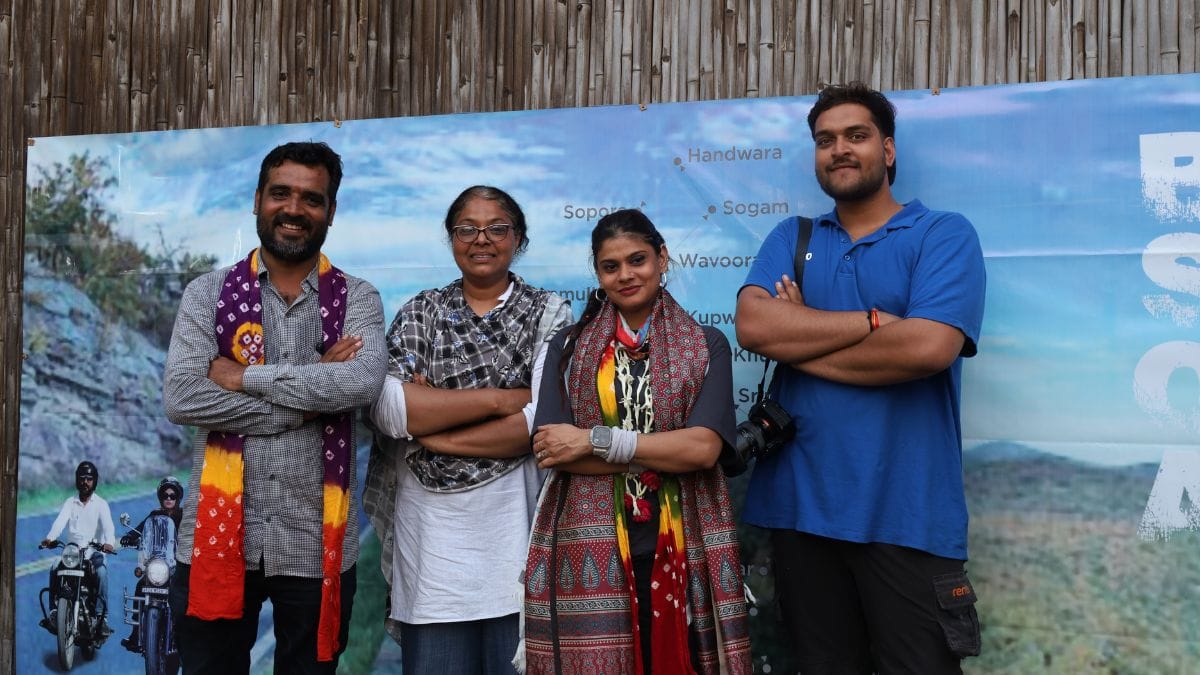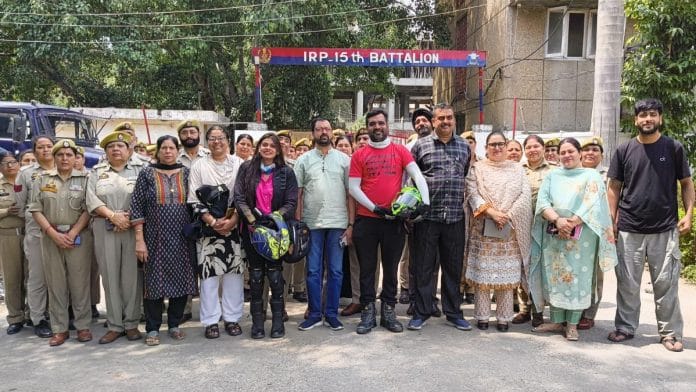New Delhi: A cloudburst, a landslide, and even the Pahalgam terror attack couldn’t stop Seher Hashmi from completing her 3,100-kilometre motorcycle journey from Delhi’s Dwarka to Kashmir’s Srinagar and back. The initiative had two bikers and three supporting members in a car. Titled ‘Breaking Stigma – One Mile at a Time’, it aimed to start conversations on mental health.
Throughout the journey, fashion stylist Hashmi and her team conducted more than 30 mental health awareness sessions across 20 cities. Each session began with Hashmi sharing her personal experience of living with mental illness. This was followed by Dev Desai—Hashmi’s co-rider and a human rights activist—who spoke from the perspective of a caregiver, offering guidance on how to support loved ones. These interactive sessions reached diverse audiences, from school and college students to working professionals, from urban centres such as Chandigarh and Jammu to rural regions such as Kupwara and Pattan.
Having lived with the stigma surrounding clinical depression and borderline personality disorder, Hashmi was motivated to complete the ride. “Even if I die, I will do this,” she said, upon her return to Jamia Nagar’s Saiyidain Manzil on 8 May, a day after India launched Operation Sindoor.
Hashmi and her team received a grand welcome as family, friends, and followers showered them with flowers at the culmination programme in Delhi. There were speeches, stories, and tears, as 70 people gathered to celebrate the feat.
Amid a mixed crowd of middle-aged people and college students, Hashmi stressed the idea that mental health is not a solitary battle.

Worried for Kashmiri friends
Dev Desai said that during the trip, he kept calling his Kashmiri friends who lived outside the Valley. Even as he stood at the epicentre of danger, the 38-year-old was worried for their safety. In the aftermath of the Pahalgam terror attack that killed 26 civilians, many Kashmiris living outside faced discrimination in different parts of India.
Desai emphasised that mental health is also political. “The stereotypes and false rhetoric imposed on Kashmiris are a cause of many mental health issues in Kashmir,” he said.
On the evening of 23 April, the riders were scheduled to cross into Kashmir, when a cloudburst led to the closure of NH44 near Ramban. With the route blocked, they changed course the next day, going through the snow-covered Pir Ki Gali via the Mughal Road—a stretch so narrow and unstable it barely qualifies as a road.
Another obstacle awaited at Goose, Kupwara, where the area had been closed to non-locals and non-state residents after the Pahalgam terror attack. The team was stopped and had to obtain special clearance from the SSP, DC, and the army to proceed.
The groundwork for the initiative was laid by Seher’s parents, Shabnam Hashmi and Gauhar Raza, who built the team and handled the logistics of the journey.
“What I feared most was that she wouldn’t be able to complete it. Because if she didn’t finish, others might never even begin,” Raza said to roaring applause from the audience.
Also read: Vajpayee govt set a standard in accountability. Now, govt bodies deflect questions on poverty
Safety vs agency
Seher Hashmi is often mistaken for a man when riding with her helmet on—a detail she sometimes uses to surprise her audience by entering sessions still geared up.
Before setting out, Hashmi was told to hire an ambulance escort. Instead, she chose to ride with a singer, a filmmaker, and a social activist.
“The bike became part of the message,” she said. It became a metaphor of direction, agency, and momentum.
The group that travelled to Kashmir with Hashmi and Desai included Nazneen Shaikh, a 46-year-old social activist, who works to educate underprivileged children in Dhule, Maharashtra. Shaikh broke stereotypes about what divorced women and single women could do. She sang of hope, strength, and belonging at every session.
Samanyu Shukla, a photographer and filmmaker from Madhya Pradesh, documented the journey. The 24-year-old didn’t even tell his family he was travelling to Kashmir. The ride was on even as India-Pakistan tensions ratcheted up over the Pahalgam attack. Shukla attributed this sense of safety to the people of Jammu and Kashmir, who went out of their way and actively made him feel safe.
Also read: Nehru worried about Indus Waters Treaty. He signed it to ‘buy peace’ with Pakistan
Mental health session for Policewomen
Hashmi made sure every one of the 3,200 individuals she interacted with left with actionable tools: how to spot signs of distress, where to seek help, and how to talk to loved ones. Her team distributed pamphlets with helpline numbers vetted by her team.
She shared how young girls often identified with her story and would open up to her.
One of the most moving sessions, Hashmi and Shaikh recalled, took place in Jammu, where over 50 women from the IRP 15th Battalion of the J&K Armed Police attended in uniform—curious but cautious. The session opened the floor for a rare dialogue among the police force. By the end, the SP stood up and shared his own experience with mental health and how he had sought professional help.
“It changed everything,” Hashmi said. “The women opened up, they asked questions; they shared.”
Initially unsure whether a motorcycle ride fit into his brand of political activism, Dev Desai joined the journey with hesitation. But a conversation with Raza shifted his view.
“Mental health is part of India’s social infrastructure,” he said. “You can enter through gender, caste, communal harmony—but eventually, you’ll hit mental health.”
Aleeza Ahmed is an intern at ThePrint. She is an alumna of the second batch of ThePrint School of Journalism.
(Edited by Prasanna Bachchhav)






